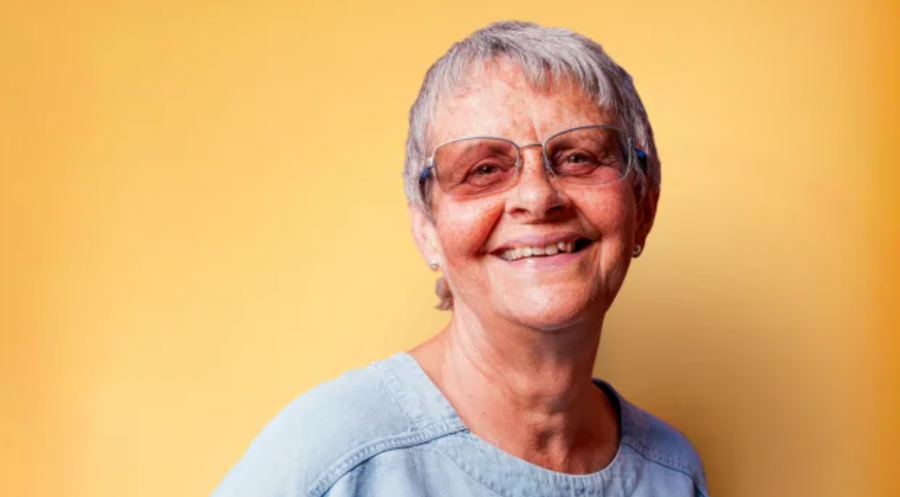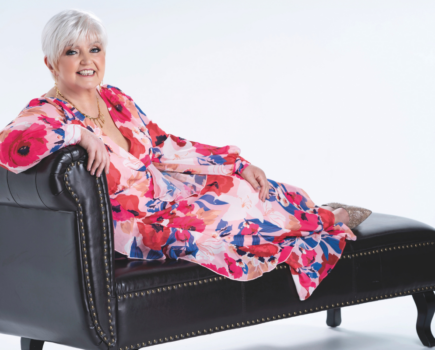Wendy Mitchell wrote a Sunday Times bestselling memoir about her experience being diagnosed and living with dementia. Now, she’s back and ready to debunk dementia myths and spread awareness, as she shares with Louise Ramsay.
On a sunny afternoon, Wendy Mitchell saw her father in her garden, smiling at her through the windowpanes of her conservatory. She was indoors with a cup of tea, whilst he was standing in his baggy green cardigan he always wore, his fingers stained yellow with nicotine and his black, Brylcreemed hair shining. She smiled at him, and he smiled back. A single moment of joy. Wendy smiled at him, for how long she doesn’t know. Minutes. Maybe hours.
But her beloved father had been dead for 20 years. There was no one out in the garden.
This has been one of the many vivid hallucinations Wendy experiences, she writes in her new bestselling book What I Wish People Knew About Dementia. Wendy, now 65, was diagnosed with young-onset dementia at 58. Other hallucinations she’s experienced have be an escalator turning into a waterfall, or a pattern carpet writhing with creatures. Someone dressed in black transforms into a disembodied head floating above her.
But while some of these visions can be considered frightening, Wendy accepts the trick dementia is playing as something more like a gift. It gives her a chance to see her father again, after all.
“I call moments like that a ‘gift’ of dementia, mainly because I know dementia would hate the idea of giving ‘gifts’,” she says. “You can get very scared or confused when you hallucinate, but this time I allowed myself to relish this moment as it allowed me to see my father just one more time. I embraced the moment instead of turning away.”
It’s something many get wrong with dementia. Instead of considering memories to have the ability of shifting or changing, they think dementia is simply all about forgetting. And it’s something that took Wendy by surprise, too.
“One of the main myths I want to debunk is that dementia is about so much more than memory,” she says. “When people hear the word dementia, they skip straight to the end stages, forgetting there’s a beginning and middle before the end and still so much life to be lived albeit differently and with support; that you can live a fulfilling life with dementia.
“You can learn new things and carry on enjoying those things previously loved. You are a valuable part of your community as we all had talents before a diagnosis, we don’t suddenly lose those talents overnight.
“I want people to understand that it’s about so much more than memory. If memory is the only bit care partners concentrate on, they’re missing helping and understanding us in so many other ways.”
What I Wish People Knew About Dementia has done the remarkable job of taking an experience many of us would undoubtedly struggle with, perhaps find frustrating, upsetting or fearful, and has put an enlightening spin on it. Wendy everyday shines this light on dementia and the realities of living with the illness — her book shows that the diagnosis is what you make of it. There is always another element to a journey we forget, when we feel we are in the middle of difficulty. With losses, you can discover unexpected gains, for problems, you can find solutions. For Wendy, the diagnoses of dementia is not an end, but rather the start of a new chapter. Despair turns to hope, darkness finds itself with a light.
“I’m a glass half-full person,” she says. “And so anything negative that comes at me, I try and turn it round into a positive. I never dwell on what I can’t do anymore because that would make you miserable.”
She continues, saying, “Dementia has left me with 3 emotions, happy, sad and content. I think I’m lucky, as some of my friends have been left with anger and negative emotions. What it means for me is events that are happy and sad, leave me feeling immensely happy or immensely sad and these occasions I rarely forget.
“Emotions of how we feel never leave us, as that’s a different part of the brain so how someone makes you feel stays with us. The reason, or the words spoken will be immediately lost, but we’ll remember how people made us feel.”
Wendy finds solace in her blog. She started her blog, Which Me Am I Today?, after she was diagnosed. She writes, “I started this blog to allow me, in the first instance, to write all my thoughts before they’re lost. Luckily, the part of my brain that allows me to type hasn’t broken yet, and I find that easier than talking. I have calendars that take care of the future, but this blog serves as a reminder of what I’ve done and said in the past — it now serves as my memory. If anyone chooses to follow my ramblings it will serve as a way of raising awareness.
“It will hopefully convey the helplessness of those diagnosed with dementia, as there is no cure – the end is inevitable. However, I’m also hoping I can convey that, although we’ve been diagnosed, people like me still have a substantial contribution to make; we still have a sense of humour; we still have feelings.”
“My fingers can type as though dementia never entered my world; they type quicker than I can think and speak the words,” she says. “Like a string of fairy lights, each fairy light represents a different function of the brain. Different fairy lights flicker and fail for each of us. That’s why I can type and others can’t.”
And her blog is read across the globe. Wendy shares, “One woman in Hawaii has dementia and she said my drive has made her no longer afraid to live alone. It’s amazing, that tiny connection with so many miles between us.”
People living with dementia (and those who care and live with them) know that the suffering it can bring can be difficult, but how the world treats those who live with dementia can be just as tough. Wendy discovered this in a hard way — her sense of self, and her way of life, changed when she first got her diagnosis and it took many years for her to find a way to ‘live well with dementia’. Her ability to continually discover the light is admirable — but Wendy doesn’t want you to just sit and admire. She wants you to recognise those with dementia should not be cast aside or forgotten, the way society can do.
Dementia is an “unwanted guest in the house that came one day and has now fully unpacked its bags and decided to stay, and I can’t get rid of it”, Wendy says.
Yet she lives alone, independently, and refuses to allow her daughters — who she raised as a single mother — to be her carers. When they began helping her zip up her coat, she soon forgot how do it herself. In her typical determined fashion, Wendy told them to stop trying to help her with her coat and slowly relearned.
“For the kindest of reasons, people wrap us up in cotton wool, and it’s the worst thing you can do for us,” she told me. “Whilst seeming kind, this is actually the worst thing you can do for us. If we don’t do something day after day, we soon forget, then you’re left with performing that task for us forever more. What does it matter if we take an hour to put on our coat? It means you can do something else and we still have that self-respect that dementia often strips away from us.
“Don’t concentrate on our losses and the things we can’t do, instead concentrate on what we CAN do.”
Smell hallucinations are another thing that many don’t know about when they think of dementia, but it can send Wendy searching the house for a non-existent source of burning. She doesn’t experience hunger or thirst — losing the pleasure of her beloved cup of Yorkshire Tea hit particularly hard — yet she keeps up the daily habit because the warmth of the mug brings comfort.
Colour is another difficulty, as she struggles to make out contrast and tone — similar colours can blend into each other. For example, she may be unable to see white rice on a white plate, so swaps it for a yellow plate. When she stopped using a plate, she simply swapped to a bowl. Her mantra is ‘there’s always a way’.
Other practical tricks include having images on cupboard doors to show her what’s inside, while she has a royal-blue colour bordering her light switches, so Wendy can see them more easily on the walls.
She writes on her blog on her 65th birthday, “I’ve achieved more in my 60s than in any other decade.”
Her book, which she wrote with the help of Anna Wharton, includes the comments of friends who also live with dementia, and it’s both a how-to manual to live with dementia, but also how to care for someone you know and the ways to effectively support them. It is divided into six sections — Senses, Relationships, Communication, Environment, Emotion and Attitude — with each section subdivided into easily digestible pieces of guidance. It’s informative yet joyful, packed to the brim with advice without feeling too science heavy for the uninitiated. And as always, it shows Wendy’s canny ability to shine a light and share stories of others.
When Wendy received her diagnosis, she had been working as a senior NHS administrator for 20 years, rostering nursing shifts and known around the office as the ‘guru’ for her power of recall. She only realised something wasn’t quite right when she started to fall while out jogging, taking nearly two years to find out what was the matter.
But looking back, she’s once again turning it to a positive: “People with dementia can teach those without it so much about enjoying their life!” she laughs. “I was as guilty as anyone when I was working: I wished for the weekend, I wished for the end of the day, I wished for the next holiday. You’re wishing your life away. The only certainty we have in this life is this moment, no one knows what the next moment will bring. So enjoy it.”
On her blog, Wendy states, “What I want is not sympathy. What I want is simply to raise awareness.” And raising awareness she has — with two bestselling books under her belt to boot, media appearances and much more. The light grows brighter, the darkness retreats. And more of us are better for it — better informed and aware, able to care better for our loved ones.








